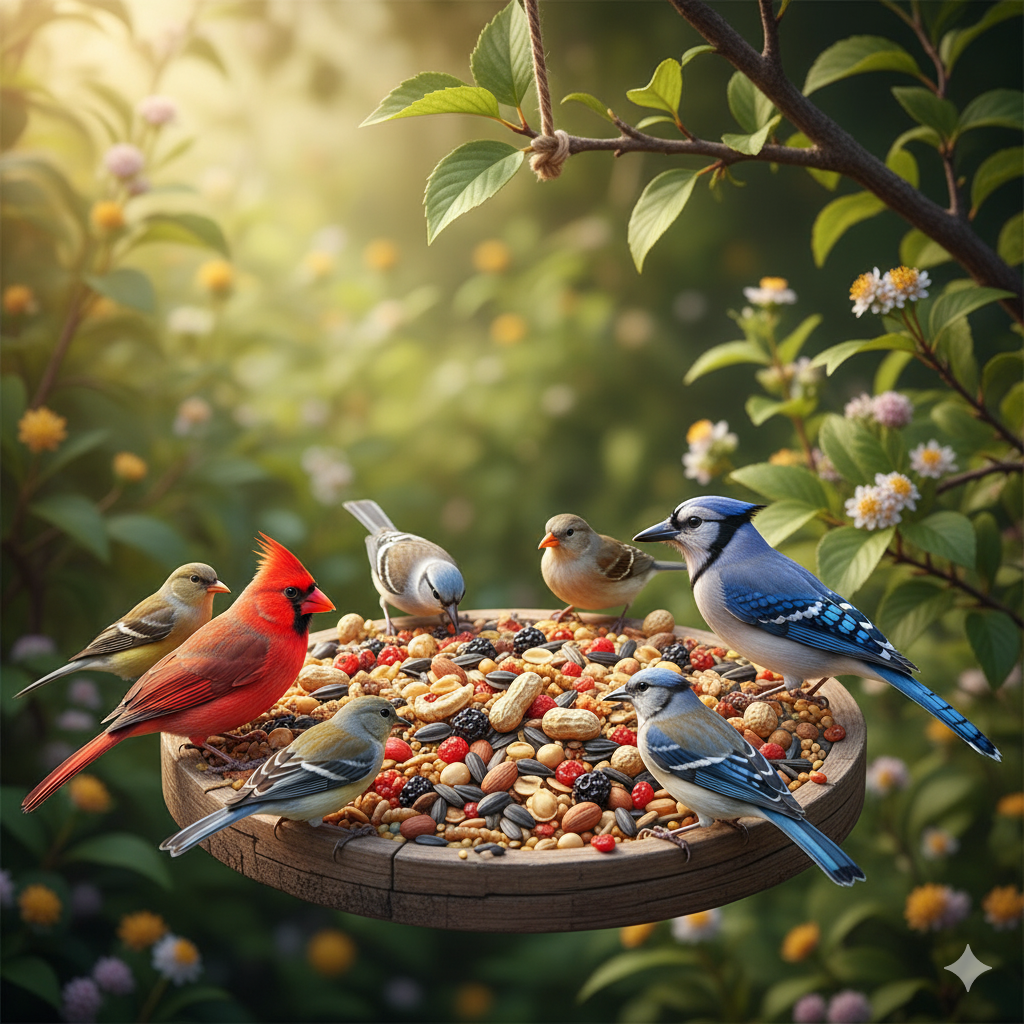
Wild birds play a crucial role in our ecosystem, from pollination to pest control, making it essential to provide them with the best possible nutrition. Offering high-quality wild bird food not only supports their health but also ensures they thrive in their natural habitat. Whether you are a bird enthusiast or simply enjoy watching birds visit your garden, understanding the impact of wild bird food seed on their well-being is key.
In this article, we’ll explore why the best wild bird food matters, how it affects bird health, and what you should look for when selecting bird food.
Why High-Quality Wild Bird Food Matters
Just like humans, birds require a balanced diet to stay healthy. Many cheap bird food blends contain fillers such as milo, wheat, and cracked corn, which offer little nutritional value. High-quality wild bird food provides essential nutrients, proteins, and fats that contribute to:
- Stronger immune systems – Reducing the risk of diseases.
- Better feather health – Ensuring insulation and aerodynamics.
- Increased energy – Helping with migration and survival in extreme weather.
- Higher reproductive success – Leading to healthier chicks.
By choosing the best wild bird food, you’re directly supporting local bird populations and helping them thrive.
Nutritional Components of the Best Wild Bird Food
High-quality wild bird food seed should contain a variety of nutrient-dense ingredients. Here are some essential components to look for:
1. Sunflower Seeds
- Black-oil sunflower seeds are rich in healthy fats and proteins.
- A favorite among finches, cardinals, and chickadees.
2. Safflower Seeds
- High in fat and protein.
- Loved by cardinals but avoided by squirrels.
3. Nyjer (Thistle) Seeds
- Packed with oils and proteins.
- Excellent for attracting goldfinches and siskins.
4. Peanuts and Tree Nuts
- Provide energy-rich proteins and fats.
- Ideal for woodpeckers, blue jays, and nuthatches.
5. Suet
- High-fat content, perfect for winter feeding.
- Supports insect-eating birds like woodpeckers.
6. Dried Fruits and Berries
- Natural sugar sources that provide quick energy.
- Attract robins, bluebirds, and waxwings.
7. Millet and Cracked Corn
- Suitable for ground-feeding birds like sparrows and doves.
- Should be fed in moderation to avoid attracting pests.
How Poor-Quality Wild Bird Food Can Harm Birds
While high-quality wild bird food benefits birds, low-quality food can do more harm than good. Here’s why you should avoid cheap, filler-heavy blends:
- Lack of Nutrition – Cheap bird seed often contains fillers that provide little nourishment.
- Mold and Spoilage – Stale or contaminated food can lead to fungal infections.
- Pesticides and Additives – Some low-grade seeds contain harmful chemicals.
- Attracting Pests – Low-quality food attracts rodents and unwanted wildlife.
Choosing the best wild bird food ensures that birds receive only the most beneficial nutrients without exposure to harmful substances.
Tips for Choosing the Best Wild Bird Food
To provide birds with the highest-quality food, keep these tips in mind:
Check the Ingredients – Look for nutrient-rich seeds like sunflower, safflower, and nyjer.
Avoid Fillers – Stay away from excessive corn, milo, and wheat.
Choose Fresh Products – Ensure that the seeds are fresh and not moldy.
Opt for Organic Options – Pesticide-free bird food is safer for birds and the environment.
Match the Food to the Birds – Different species prefer different seeds.
Investing in premium wild bird food seed will attract more bird species to your yard and support their overall health.
How to Properly Store Wild Bird Food
Proper storage is key to maintaining the quality of wild bird food and preventing contamination. Follow these best practices:
- Use Airtight Containers – Prevents moisture and pests.
- Store in a Cool, Dry Place – Avoids mold and spoilage.
- Buy in Small Quantities – Ensures freshness.
- Check for Mold Regularly – Discard any spoiled seeds immediately.
Maintaining fresh and clean bird food will keep your feathered visitors healthy and happy.
Final Thoughts
Providing high-quality wild bird food is one of the best ways to support bird health, helping them stay strong, vibrant, and thriving throughout the year. By choosing the best wild bird food that is rich in nutrients and free from fillers, you can attract a diverse range of species while ensuring they get the nourishment they need.
Whether you’re feeding songbirds, woodpeckers, or finches, always opt for wild bird food seed that offers the best combination of proteins, fats, and vitamins. With proper storage and feeder maintenance, you can enjoy the beauty of wild birds while making a positive impact on their well-being.
FAQs
1. What is the best wild bird food for year-round feeding?
The best options for year-round feeding include black-oil sunflower seeds, nyjer seeds, suet, and peanuts, as they provide essential nutrients for different seasons.
2. How often should I refill my bird feeder?
It depends on bird activity, but checking and refilling feeders every 2-3 days ensures a consistent food supply.
3. Can wild birds eat human food scraps?
While some birds may eat certain leftovers like fruit or unsalted nuts, it’s best to stick with natural, high-quality wild bird food seed to ensure they receive proper nutrition.
4. Is it okay to feed bread to birds?
No, bread lacks nutrients and can cause digestive issues in birds. It’s better to provide seeds, fruits, and nuts.
5. Why are birds not eating from my feeder?
Common reasons include stale or low-quality food, feeder placement, or the presence of predators. Switching to the best wild bird food and placing the feeder in a safe, quiet location can help attract birds.